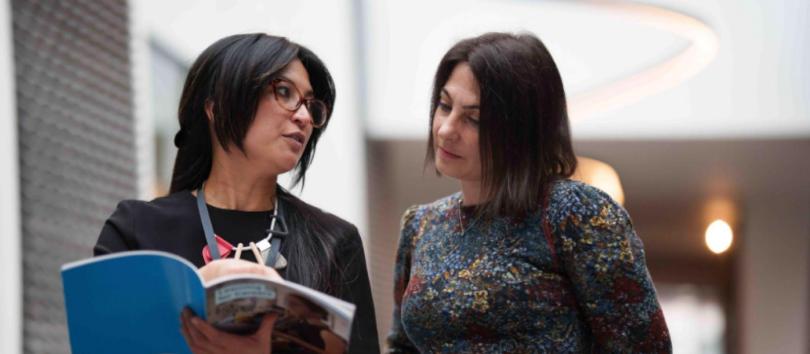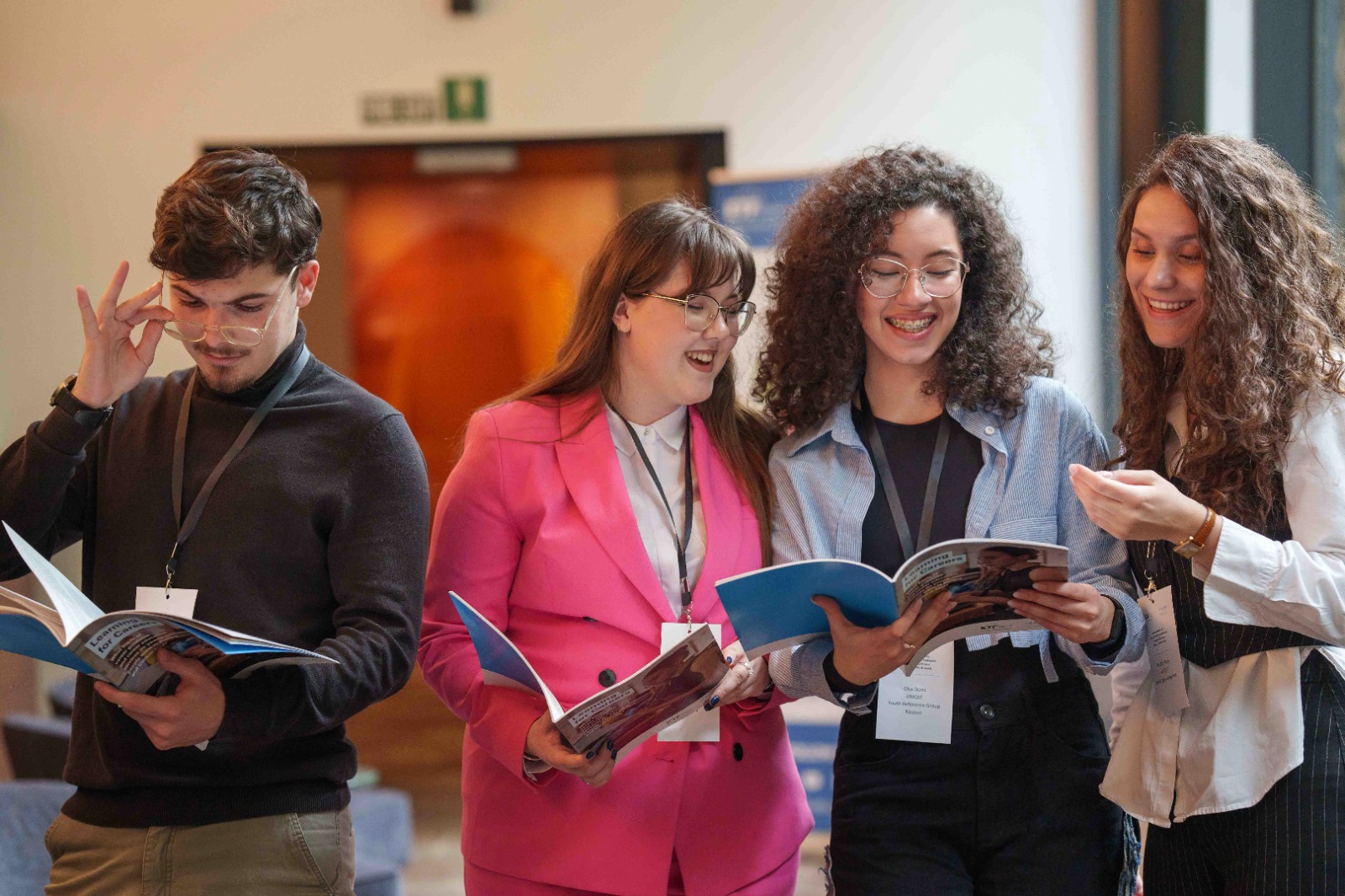
Career guidance is not just about thinking about the future, it is about tackling the present
A joint European Training Foundation (ETF) and United Nations Children's Fund (UNICEF) Regional Office for Europe and Central Asia event in Brussels this week, saw the presentation of the results of the ETF-UNICEF study Learning for Careers. What kinds of career guidance and career education services do young people want in Europe and Central Asia?. The preparation of the report involved consultations with over 9,600 young people across Europe and Central Asia and focused on understanding their opinions and perceptions of career guidance and training services.
The event began with an introduction from ETF Head of Unit Manuela Prina, who highlighted the relevance of the collaboration between both organisations in providing evidence for improving youth-oriented policies in the region. The message was echoed by Octavian Bivol, UNICEF Deputy Regional Director for Europe and Central Asia, who added:
"This is our third regional study with the ETF, an ongoing partnership that brings together the ETF's country-specific expertise and UNICEF's work with children and young people." "It is crucial today to address the challenges young people face in the transition from school to work at a time when it takes 42 months for young people to find their first decent job,” he added.
Mathieu Bousquet, Director at the European Commission's Directorate-General for Neighbourhood and Enlargement Negotiations (DG NEAR), highlighted the relevance of the study's findings, and framed it in the context of the COVID pandemic's impact on young people's mental health, education and employment.
"One in four young people is NEET (not in education, employment or training). Choosing a career is a difficult moment in life: this study helps to better understand the perspectives of young people, but also to highlight the importance of career guidance in a lifelong learning perspective,” Bousquet stated.
"Our challenge is not only to keep the quality of career guidance high, but also to ensure that it is accessible to all: inclusivity is crucial," stressed David Dion, Acting Director for Labour Mobility and International Affairs at the Directorate-General for Employment, Social Affairs and Inclusion (DG EMPL). "Services need to be inclusive and accessible to all, and avoid biases and stereotypes, especially gender-based" ones, he added.
"What role will I play in society? And what jobs can I apply for? Do I need to develop certain skills and learn certain languages?" Lieve Verboven, Director of the ILO Office for the EU and Benelux countries, addressed the audience.
"Young and old have asked this question many times, and there is no one right answer: career guidance is a dynamic process," she noted.
Bringing a real youth perspective to research and policies
Focusing on specifics, the event conducted an in-depth examination of the data. The two coordinators of the Learning for Careers study, the ETF’s Florian Kadletz and UNICEF’s Cristina Bacalso, discussed the insights with the main contributors: young people, the real co-designers and implementers of the focus groups in their own countries.
Young representatives from the Western Balkans, Central Asia and Ukraine – the latter being a specific target of the study – discussed the most striking figures. According to the survey, the two main channels through which young people seek information when looking for a job are the internet and social media, which poses challenges in terms of the quality of information. Another challenge for young people in their job search is their often-unconscious compulsion to reflect parental and societal expectations, for example by preferring higher education to technical and vocational education.
Kadletz transformed findings into advice for action in policy making.
"Governments should ensure access to career guidance for all. This means integrating it from primary education with extracurricular activities, moving from a knowledge transition to practice-based approaches in education,” he said. “Another crucial point is that in many countries career guidance is not even a stable profession, but only a voluntary activity.”
Challenges and opportunities in career guidance for young people
Broadening the perspective to the European Union’s (EU) initiatives, the ETF’s Cristina Mereuta moderated a discussion highlighting the role of EU flagship projects such as the Erasmus+ programme and the Youth Guarantee, an initiative aimed at smoothing young people's transition from school to work. Putting the spotlight on the latter, DG EMPL’s Emmanuelle Roure pointed out the relevance of looking beyond EU borders, as is successfully happening in Western Balkan countries such as North Macedonia, a clear frontrunner.
Goran Petkovski from the Employment Service Agency of North Macedonia presented the results of well-functioning public services.
Counselling, self-help tools for jobseekers, vocational orientation have supported the integration of "about 100,000 young people in the North Macedonian job market since the pilot phase in 2018," Petkovski said.
The case of Ukraine was highlighted by Hanna Voronina, co-author of the ETF review of the career guidance system in the country. Outlining the development of various projects, Voronina focused on pre-conflict initiatives such as “Career Hub Ukraine” and digital platforms for vocational education and training. In addition, Iryna Shumik, Director for Vocational Education at Ukraine's Ministry of Education and Science, highlighted the importance of going beyond career guidance, and associating it to psychological counselling, especially for vulnerable groups such as war veterans.
Shumik also presented "what we in Ukraine call the Netflix of education", Diya Osvita, which offers specialised courses on essential career skills such as CV writing, interview preparation and retraining.
Inspirational practice from partner countries
Looking closely at national practice, Corinne Lamontagne from the Euroguidance network, shared insights from Finland and France. Lamontagne identified commonalities, such as a multidisciplinary approach, local and regional focuses, multi-channel delivery of services, and strong partnerships; but also, differences such as eligibility criteria and target groups.
Exploring pioneering initiatives from Albania and Montenegro, panellists highlighted specific regional needs and the need to integrate career guidance into the education system. To this purpose, partnerships emerged as a key factor to build progress.
Prof. Peter Weber from the University of Applied Labour Studies of the German Public Employment Service presented an insightful comparison of the old and new approaches to career guidance:
“It is of utmost importance to address social segregation and integrate emotional skills into the working man,” he said.
Young people's voices: the pathway towards better career guidance services
Refocussing on the main contributors of the study – young people – a closing workshop challenged participants’ minds to transform the key findings of the study into strategies to generate impactful policies, programmes and practices. A clear call was shared by all: career guidance is not only about thinking about the future, but it is about tackling the present. Praising the outcomes of the discussion, Manuela Prina and Octavian Bivol closed the event by highlighting the importance of translating research into policy action.
“The growing and fruitful cooperation between the ETF and UNICEF will play a key role in this,” Prina and Bivol agreed.
Did you like this article? If you would like to be notified when new content like this is published, subscribe to receive our email alerts.